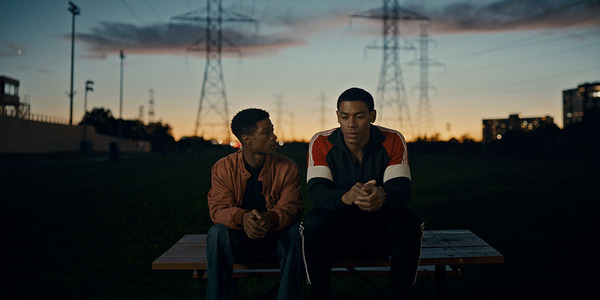Toronto International Film Festival 2022: BROTHER

Wilson is a cinema enthusiast based out of Toronto, Canada.…
Having a film about one of Toronto’s most venerable suburbs – Scarborough – two years in a row at the Toronto International Film Festival feels almost surreal. Following last year’s Scarborough, the festival is now graced with Clement Virgo’s Brother; a film that is boldly atmospheric and deeply emotional. Not a de-facto representation of what it’s like to live in Scarborough, but illustrates a common narrative for struggling immigrants in an artistically sound fashion, with standout performances across the board.
Based on a novel by David Chariandy and taking place in 1990s Scarborough, the film revolves around two Jamaican-Canadian brothers, Michael (Lamar Johnson) and Francis (Aaron Pierre), who navigate the adversities of life with their strong-minded mother (Marsha Stephanie Blake). Not living in the safest of neighbourhoods, the story delves into both the struggles and revelations of being delt an unfair hand in life.
A melancholic immigrant story
As someone who was born and raised in Scarborough, I can say that Brother isn’t meant to be a complete representation of one’s experience living in the suburb. It is, however, a ballad of the immigrant experience and the confined opportunities that often come with that experience. Despite being in a country with relative freedoms, the film’s characters are forced to make decisions that are circumstantial at best. The idea that they have to choose between one thing or another – whether it’s family over true happiness, power over safety – is such a powerful statement and really underscores the entire narrative. Even if the story itself isn’t what every immigrant might experience, the collective struggles of making imperfect decisions helps establish a commonality for viewers.
And having elements of a typical narrative documenting a world of racially charged violence, Virgo finds a way to elevate the film’s narration by creating an overly somber tone that constantly evolves with the story’s alternating timelines. From the very beginning, there’s something ominous with the way Virgo establishes the film. Whether it’s Guy Godfree’s muted cinematography or Todor Kobakov’s melancholic score, Brother feels almost like a modernized Greek tragedy on a smaller scale. There’s a sense of grandeur seeping through its narrative core, creating a sense of purpose in what the film is trying to say. This becomes particularly apparent with the film’s emphatic detailing of police brutality, which always feels weighted, but never exploitative. Virgo knows how to deliver a strong message, and does so without signs of sensationalism.

Yet another (sad) film about Scarborough
It might not be fair to compare Brother to last year’s Scarborough, as both films set out to do very different things, but it’s also hard not to. Up until last year, a film about the suburb didn’t even exist, and now we have two stories that highlight a part of the city that is rarely represented on screen. Both tell a very specific story that targets different experiences, creating a growing diaspora of what it’s like to live in Scarborough. And while Brother is a stronger film overall, both in terms of its stylistic and narrative intentions, both films are clear exercises in empathetic storytelling.
But what plagues both films is that they essentially encapsulate the struggles of the Scarborough experience, rather than highlighting the suburb’s beauty and strengths. Brother does feature a breathtaking view of the Rouge Valley, but paints an otherwise bleak picture of what can also be one of the most diverse and beautiful areas in Toronto. The film does find strength through its characters and their general embodiments of resilience, but this isn’t a big enough focus to shift the narrative in a more positive direction. Not that the narrative should have been sugar coated by any means, but one can’t help but yearn for hints of what also makes Scarborough such a great place to live.
Overall thoughts
On the whole, Brother is a striking example of narrative storytelling that reaches a fairly high emotional altitude. Virgo really flexes his filmmaking prowess here, creating a powerful narrative exercise that speaks volume to the struggles of the immigrant experience that is blended into an examination of racial injustice. Here’s hoping the next film about Scarborough is one that captures a more positive outlook, but it’s nevertheless a joy to see this uniquely beautiful part of the city represented on screen.
Does content like this matter to you?
Become a Member and support film journalism. Unlock access to all of Film Inquiry`s great articles. Join a community of like-minded readers who are passionate about cinema - get access to our private members Network, give back to independent filmmakers, and more.
Wilson is a cinema enthusiast based out of Toronto, Canada. He escapes from his day job by writing random thoughts about cinema on the internet. Although he has a longstanding penchant for Hong Kong cinema, he considers himself to be an advocate for Asian cinema in general. He has been attending the Toronto International Film Festival every year since 2005, and more of his work can be found on his website: www.wilson-kwong.com.













